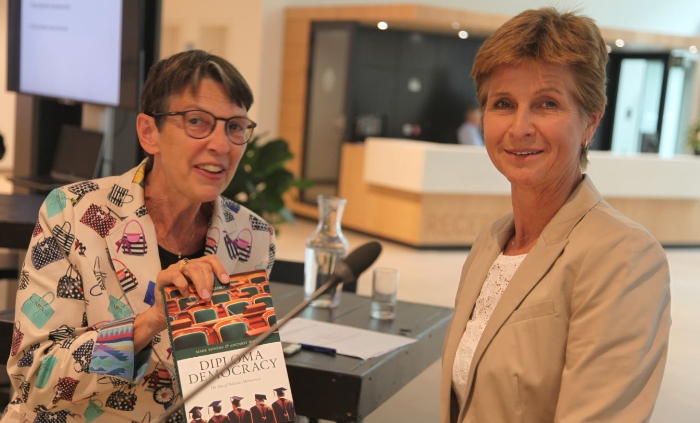
Can ‘diploma democracy’ be stopped?
Almost all the members of the Dutch House of Representatives, ministers and government officials are university educated. At the same time, the large majority of the electorate have a lower level of education, or even no education. How much of a problem is that? Two new books warn about this gap in the level of education between citizens and government.
Anyone looking at the composition of the Dutch House of Representatives a few decades ago would have seen a reasonably balanced reflection of the level of education within society. Dignitaries and aristocrats shared the stage with former labourers and farmers. In particular the confessional and social democratic parties had many members in their ranks with a low level of education but with a lot of practical experience on the work floor.
Today the House of Representatives has become even more diverse. Ethnic minorities, women and sexual minorities are now well represented. At the same time, the level of education of MPs has risen considerably in recent decades. In the current situation, no fewer than 96 per cent of MPs have a degree from a university of applied sciences or an academic university. As a comparison, around 70 to 80 per cent of the electorate do not have this level of education.
Education as dividing line
The question then arises of whether this is a matter for concern. According to public administration specialist Anchrit Wille at Leiden University, it is. She and Mark Bovens (Utrecht University) together wrote the authoritative book Diplomademocratie (2010), that has just been published in English. 'The people with the highest education now dominate almost all important political and social functions,' she commented on 3 July during the book presentation in Leiden University's Wijnhaven building. 'Education has become the main dividing line in society. Even though we have had general suffrage for the past hundred years, its place has been taken by a new form of inequality.'

This diploma democracy – or ‘meritocracy’ – can cause less well educated people to feel that they are no longer represented in the democratic system, which can in turn result in low turn-outs for elections. In European elections, only about one-third of those eligible to vote actually do vote. Wille: ‘And you have to bear in mind that book learning isn't the same as real life learning. This makes it more difficult for politicans to empathise with the concerns and wishes of the general public.' Another effect is that less well-educated citizens often have less trust in politicians.
Enforcing an economic agenda
Knowledge is clearly power. This is also apparent from the book The Power of Economists within the State by public administration expert Johan Christensen from Leiden University (see main image). He researched the influence of economists on national economic policies in New Zealand, Ireland, Norway and Denmark. They were shown to have considerable influence. Countries where many economists work in ministerial posts (New Zealand and Norway) went much further in implementing neoclassical economic measures. These measures led, for example, to the privatisation of public companies and the liberalisation of international trade.
‘Government officers trained in economics are, of course, better able to advise ministers and state secretaries,' Christensen comments. 'At the same time, a person's education is never completely unbiased. You see that economists in New Zealand and Norway were often aggressive in how they enforced an agenda that closely reflected the dominant economic ideas of the time.' The less well-educated are often not in favour of this far-reaching liberalisation. You can see that, for example, in the different positions taken on Europe or worker migration.

Watching and having influence
Outgoing state secretary Jetta Klijnsma (Social Affairs and Employment) recognises the problem all too well. 'We have to keep access to public administration open for people with a lower level of education,' she stated when the two books were presented to her. 'It has to be possible for everyone not only to watch the political game from the sidelines, but also to exercise fundamental influence. It's regrettable, but we have to recognise that that isn't always the case.'
Or is it? Mark Bovens regards the rise of populist parties as a 'possible restoration of the old order.' Voters who have a lower level of education are forcing the established parties to modify their party programmes. However, there's one thing that's still very noticeable: even these populist parties are often headed by highly educated individuals.

